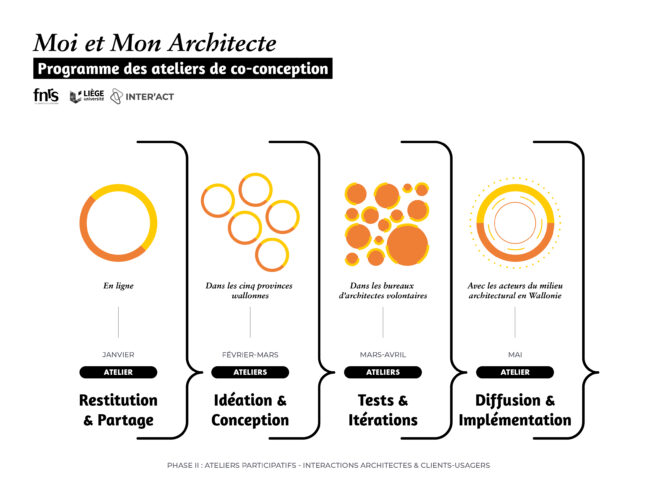Architects and end-users interactions in residential housing in Wallonia
Participatory design | Social Innovation
INTER'ACT PROJECT, University of Liege
septembre 2020
↑navigate inside the image above↑ It is our first public outcome!
This research project tackles the under-studied societal and professional challenge of users’ dissatisfaction and low involvement towards architectural design processes. Building on the assumption that most bottlenecks and frustrations could be solved as soon as the early phases of the design process, the main goal of the project is to develop renewed and dedicated interactional models, methods, and tools that will help users maximize their positive input and will help architects bridge the gap they still face towards their end-users and customers. The project unfolds around two main axes: (i) addressing “What is”, i.e. delineating current interactions, current users’ expectations, and existing modalities of users’ involvement and (ii) addressing “What could be”, i.e. researching best practices from closely related design disciplines (demonstrating the longer tradition of user-centered and -driven approaches) and adapting them to better leverage users’ expectations, experiences and willingness to get involved into the design process. The project head is Prof. Catherine Elsen, it is an Inter’Act Laboratory project at the University of Liege. Two Ph.D. projects are conducted in parallel for this research program. The funding institution is F.R.S. – FNRS. Find more detailed information about the project and lab, on the host lab webpage (Inter’Act).
>>>I bring my social design & HSS research-oriented expertise to the research team, conduct a design-driven research approach developing meta (policy, regulations, practice rules), macro (services, uses, strategies), micro (product, graphic objects, tools, and techniques) solutions or knowledge transfer to improve participation in architectural service. <<<
Our first outcome is now published after being used during the first workshop (↑above↑). 15 architects and 14 end-users were interviewed during one year. For the first workshop, we shared this data through a thematic journey to improve empathy and show the realities of each community: users and architects.

Here is a summary of the second type of workshop, it is in French!
